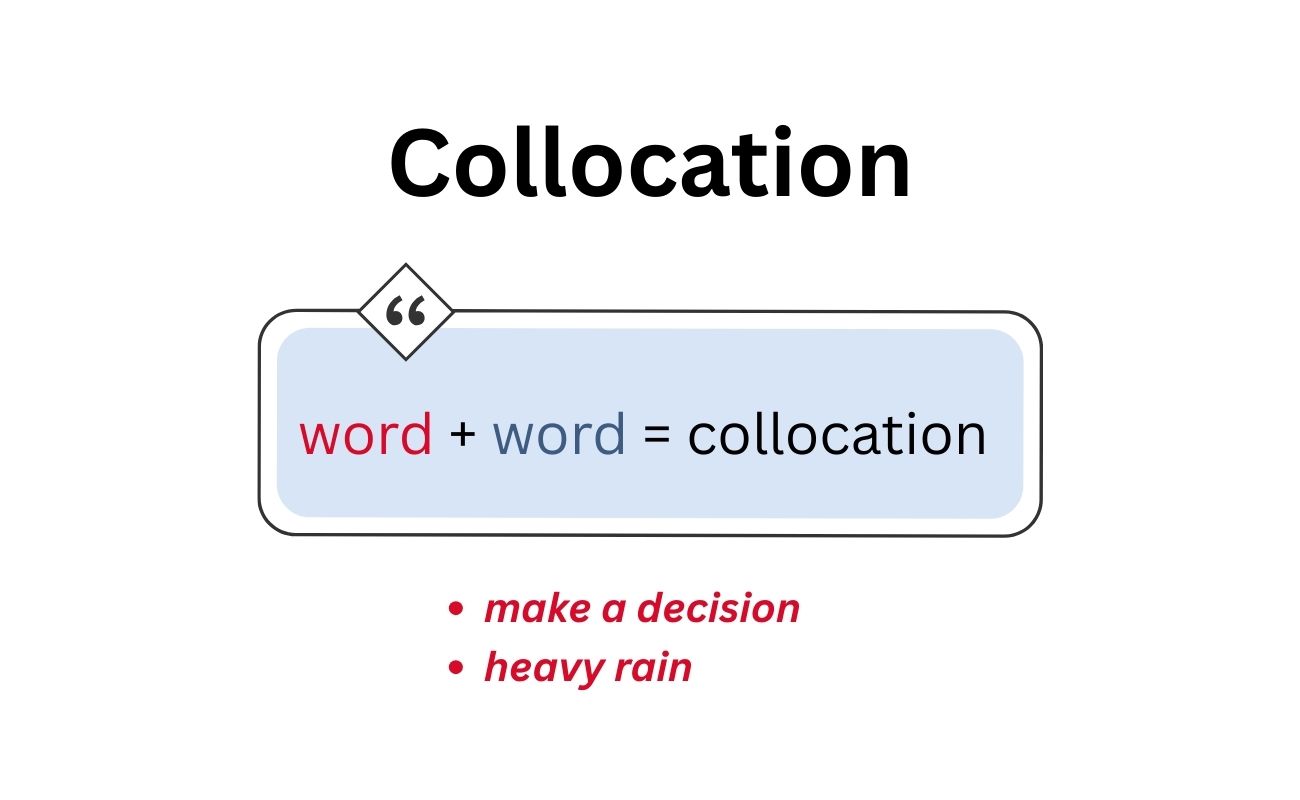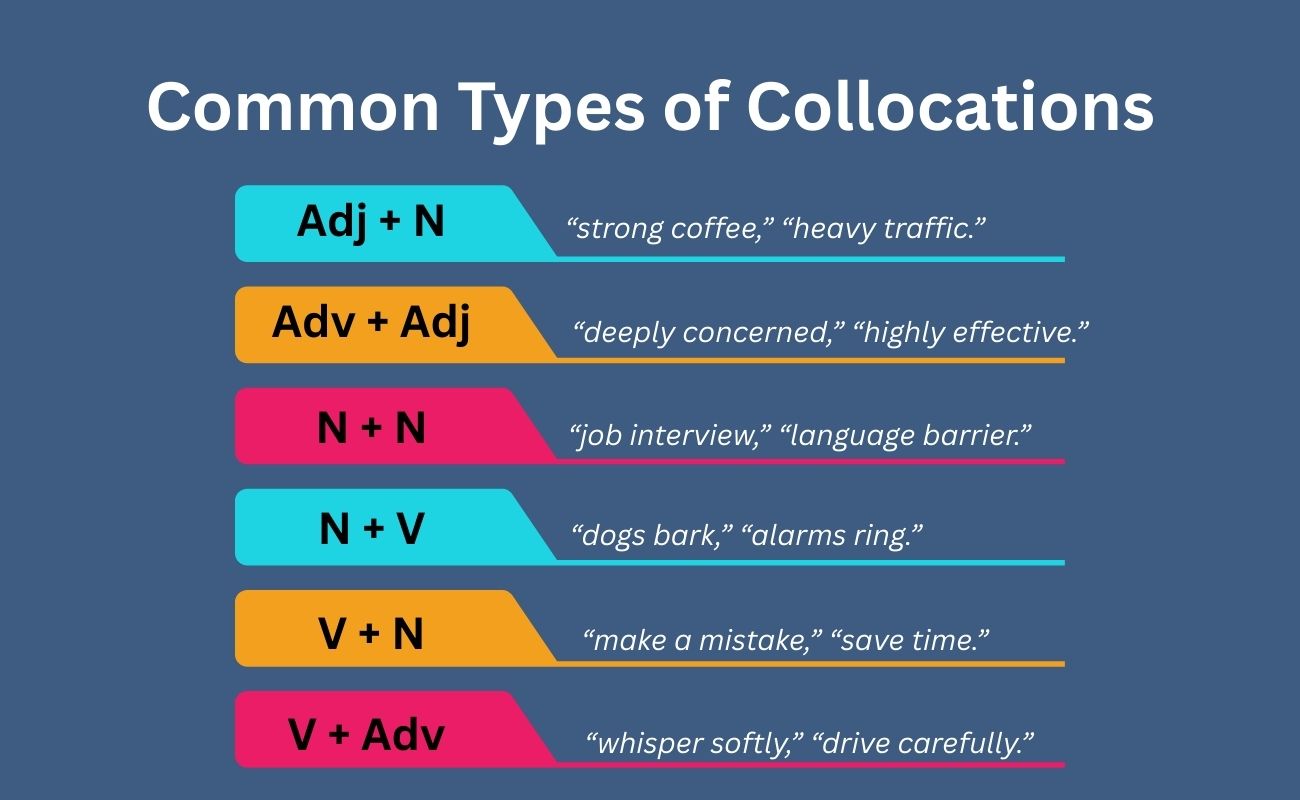What Are Collocations?

In English, a collocation is a natural combination of two or more words that frequently occur together and sound “right” to native speakers. The meaning or usage of these word pairings often differs when words are paired, compared to using them separately.
For example:
- make a decision (not do a decision)
- heavy rain (not strong rain)
These combinations are not random; they are fixed patterns that native speakers use instinctively. Instead of translating word by word, you begin to recognize and use the natural building blocks of English.
Common Types of Collocations
Collocations may sound technical at first, but they simply describe the way words tend to stick together in English. Each type follows a predictable pattern, and once you see how they work, the idea becomes much clearer.

- Adjective + Noun: An adjective frequently combines with a specific noun, fixed by usage, not grammar rules.
Example: “strong coffee,” “heavy traffic.” - Adverb + Adjective: An adverb often intensifies or modifies an adjective.
Example: “deeply concerned,” “highly effective.” - Noun + Noun: Two nouns can form a compound-like phrase.
Example: “job interview,” “language barrier.” - Noun + Verb: A noun typically acts as the subject of a verb. The verb choice is rarely interchangeable.
Example: “dogs bark,” “alarms ring.” - Verb + Noun: A verb naturally pairs with a particular object.
Example: “make a mistake,” “save time.” - Verb + Adverb: A verb is often followed by an adverb that describes how the action is done.
Example: “whisper softly,” “drive carefully.”
Once you get familiar with the logic behind them, collocations become much easier to learn and use naturally.
100+ Common Collocations in English
To sound natural in English, it’s not enough to know single words; you need to know how they go together. That’s where common collocations come in. Below is a carefully selected list of 100 everyday collocations.

| No. | Letter | Common collocation | Meaning | Example Sentence |
| 1 | A | achieve success | to accomplish something important | With hard work, you can achieve success. |
| 2 | ask a favor | to request help | Can I ask a favor of you? | |
| 3 | ask a question | to put a question to someone | She asked a difficult question during the meeting. | |
| 4 | ask permission | to request approval | You must ask permission before leaving early. | |
| 5 | attend a meeting | to be present at a meeting | Over 50 people attended the meeting yesterday. | |
| 6 | avoid mistakes | to prevent errors | Proofreading helps you avoid mistakes in your writing. | |
| 7 | B | break a promise | to fail to do what you promised | He broke his promise and didn’t come on time. |
| 8 | break the ice | to start a friendly conversation | He told a joke to break the ice at the party. | |
| 9 | break the law | to do something illegal | Anyone who breaks the law should be punished. | |
| 10 | break the news | to announce something important | She had to break the news about the accident. | |
| 11 | build trust | to establish confidence | It takes years to build trust but only seconds to break it. | |
| 12 | C | catch a cold | to become ill with a cold | He caught a cold after walking in the rain. |
| 13 | catch someone’s attention | to make someone notice | The headline caught my attention immediately. | |
| 14 | cause damage | to harm something | The storm caused serious damage to the houses. | |
| 15 | come prepared | to arrive ready for something | She always comes prepared for class. | |
| 16 | come to an agreement | to reach a decision together | After long talks, both sides came to an agreement. | |
| 17 | D | develop skills | to improve abilities | Reading widely helps you develop language skills. |
| 18 | do business | to engage in commerce | They do business with many international clients. | |
| 19 | do homework | to complete school assignments | She usually does her homework after dinner. | |
| 20 | do the laundry | to wash clothes | I need to do the laundry this weekend. | |
| 21 | draw attention to | to make people notice | The report draws attention to rising costs. | |
| 22 | E | earn money | to receive income | He earns money by working part-time. |
| 23 | earn respect | to gain admiration | She earned respect through her dedication. | |
| 24 | enjoy the benefits | to take advantage of something positive | Employees enjoy the benefits of flexible hours. | |
| 25 | exchange ideas | to share thoughts or opinions | The workshop allowed participants to exchange ideas. | |
| 26 | express interest | to show you are interested | She expressed interest in joining the project. | |
| 27 | F | face challenges | to deal with difficulties | We all face challenges in our careers. |
| 28 | face consequences | to accept the result of actions | He must face the consequences of his behavior. | |
| 29 | find a balance | to manage different aspects well | It’s important to find a balance between work and life. | |
| 30 | find a solution | to solve a problem | We must find a solution before it gets worse. | |
| 31 | follow the rules | to obey regulations | You need to follow the rules when driving. | |
| 32 | form an opinion | to decide what you think | People form opinions based on first impressions. | |
| 33 | G | gain experience | to acquire knowledge through practice | Internships help students gain experience. |
| 34 | give advice | to offer suggestions | My teacher gave me useful advice. | |
| 35 | give permission | to allow someone | Parents must give permission for the trip. | |
| 36 | go abroad | to travel to another country | She plans to go abroad for her studies. | |
| 37 | go missing | to disappear | Several files went missing from the office. | |
| 38 | H | have a chance | to have an opportunity | He has a good chance of winning. |
| 39 | have an impact | to strongly affect | The speech had a big impact on the audience. | |
| 40 | have breakfast | to eat breakfast | We had breakfast at a café near the station. | |
| 41 | hold a meeting | to organize a meeting | The company will hold a meeting next week. | |
| 42 | K | keep a promise | to do what you said you would | She always keeps her promises. |
| 43 | L | learn a lesson | to gain wisdom from experience | He learned a lesson after being late to work again. |
| 44 | lose control | to fail to maintain control | The driver lost control of the car. | |
| 45 | lose weight | to become thinner | She is trying to lose weight before summer. | |
| 46 | M | make a choice | to decide | You must make a choice between the two options. |
| 47 | make a decision | to choose after thinking | It’s time to make a decision about your future. | |
| 48 | make an effort | to try hard | She made an effort to improve her pronunciation. | |
| 49 | make an excuse | to give a reason (often not true) | He made an excuse for arriving late to the meeting. | |
| 50 | make friends | to form friendships | It’s not always easy to make friends in a new city. | |
| 51 | make money | to earn income | He made money selling handmade crafts. | |
| 52 | make progress | to improve or advance | She is making great progress in her studies. | |
| 53 | make sense | to be logical or understandable | Your explanation doesn’t make sense. | |
| 54 | meet a deadline | to finish on time | We worked late to meet the deadline. | |
| 55 | meet expectations | to achieve what is expected | The new product didn’t meet expectations. | |
| 56 | N | negotiate a deal | to discuss terms to reach agreement | The two companies negotiated a deal last year. |
| 57 | notice a difference | to see or perceive a change | You’ll notice a big difference after practice. | |
| 58 | nurse a grudge | to keep resentment | She still nurses a grudge against her old boss. | |
| 59 | O | offer advice | to provide guidance | He offered some useful advice before the exam. |
| 60 | offer support | to give help | Friends offered support during her tough time. | |
| 61 | open an account | to create a new bank account | He opened an account at the local bank. | |
| 62 | organize a party | to plan and arrange a party | They organized a party for her birthday. | |
| 63 | P | pay a visit | to go see someone | She paid a visit to her grandmother yesterday. |
| 64 | pay attention | to focus carefully | Students must pay attention in class. | |
| 65 | pay the bill | to settle a payment | Let’s pay the bill and leave. | |
| 66 | play a game | to engage in a game | The children played a game of football. | |
| 67 | play a role | to have an influence | Technology plays a key role in education. | |
| 68 | provide information | to give details | The guide provided information about the museum. | |
| 69 | Q | qualify for a job | to meet the requirements | He doesn’t qualify for the job without experience. |
| 70 | quit smoking | to stop smoking | She’s trying hard to quit smoking this year. | |
| 71 | R | raise a question | to bring up an issue | The article raises important questions about safety. |
| 72 | reach an agreement | to successfully agree | They finally reached an agreement after negotiations. | |
| 73 | run a business | to manage a company | She runs a small family business. | |
| 74 | run a risk | to expose oneself to danger | Investors run a risk when buying shares. | |
| 75 | rush into a decision | to decide too quickly | Don’t rush into a decision you may regret. | |
| 76 | S | save money | to put money aside | She saves money for her vacation. |
| 77 | set a goal | to establish an objective | He set a goal to run a marathon. | |
| 78 | set the table | to arrange dishes before a meal | The children set the table for dinner. | |
| 79 | show respect | to demonstrate politeness | You should show respect to elders. | |
| 80 | solve a problem | to find an answer | We need to solve this problem quickly. | |
| 81 | spread rumors | to share gossip | They spread rumors about their classmates. | |
| 82 | suffer a defeat | to experience loss | The team suffered a heavy defeat in the final. | |
| 83 | T | take a break | to rest | Let’s take a break after two hours of work. |
| 84 | take action | to do something to deal with a situation | The government must take action to reduce pollution. | |
| 85 | take notes | to write down key information | Students took notes during the lecture. | |
| 86 | take part in | to participate | She took part in the competition. | |
| 87 | take responsibility | to accept duty | He took responsibility for the mistake. | |
| 88 | tell a story | to narrate | Grandpa loves to tell stories about his youth. | |
| 89 | tell the truth | to be honest | Always tell the truth, even if it’s hard. | |
| 90 | train staff | to prepare employees | The company trains staff in customer service. | |
| 91 | U | undergo changes | to experience transformation | The city has undergone major changes recently. |
| 92 | V | voice an opinion | to express a viewpoint | She voiced her opinion during the debate. |
| 93 | vote against | to choose not to support | Many voted against the proposal. | |
| 94 | W | waste time | to use time poorly | Don’t waste time arguing. |
| 95 | win a prize | to receive an award | He won a prize in the contest. | |
| 96 | work hard | to put in effort | You must work hard to succeed. | |
| 97 | work overtime | to work extra hours | She often works overtime during busy seasons. | |
| 98 | write an essay | to compose a paper | The student wrote an essay about climate change. | |
| 99 | Y | yield results | to produce outcomes | The new strategy yielded good results. |
| 100 | Z | zoom in | to focus more closely | He zoomed in on the photo to see details. |
Once you are comfortable with them, it’s worth expanding into another key area of vocabulary such as common phrasal verbs. Together, collocations and phrasal verbs form the backbone of natural English expression.
Useful Exercises to Practice Common Collocations
Learning common collocations is about training your brain to notice and reproduce natural word partnerships. The more actively you work with them, the faster they become part of your everyday English.

Here are some effective ways to practice:
- Read with intention: When reading books, news, or articles, underline collocations you notice. Pay attention to patterns like “take responsibility” or “strong evidence.”
- Keep a collocation journal: Instead of writing single words, record new collocations you come across, along with an example sentence.
- Play with substitution: Take one collocation and see how far it stretches. For instance, from “make a decision” you can branch into “make an effort” or “make progress”, but you’ll quickly see why “make homework” doesn’t work.
- Use them in speaking and writing: Make a conscious effort to include collocations in daily conversation, essays, or emails. This active use helps fix them in memory.
- Do matching or gap-fill exercises: Create (or find) exercises where you pair verbs with nouns, or fill in blanks with the correct collocation.
When practiced consistently, these activities shift collocations from something you study into something you own.
Conclusion
Collocations are the key to sounding natural in English, but it’s the mastery of common phrasal verbs that truly unlocks fluency. Learning these 100+ examples will make your speech more authentic and effortless. And if you want to keep pushing your English further, explore more in-depth guides at Gurulango.